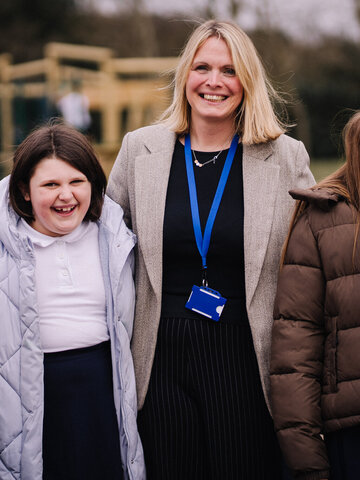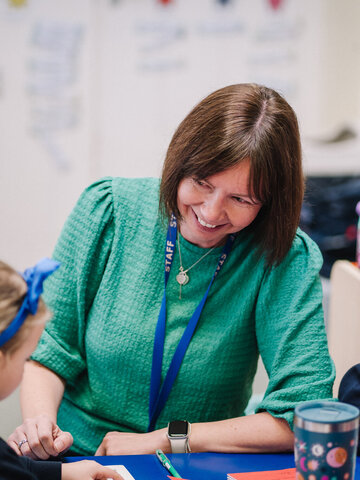Safeguarding at Read St John's
Concerned about a child?

Fran Agar
Head Teacher
Safeguarding (DSL)

Joanne Shaw
Deputy Head Teacher
Reception & Safeguarding (Deputy DSL)
Call 0300 123 6720 or out of hours 0300 123 6722.
If you think a child is in immediate danger – don’t delay call the police on 999.
Concerned about an adult that works with children?
If there are immediate safeguarding concerns to the child call 0300 123 6720 or out of hours 0300 123 6722.
If there are no immediate safeguarding concerns to the child inform senior management at the organisation where this person works.
At Read St John’s C of E Primary School we believe that everyone who comes into contact with children and their families has an important role to play in safeguarding children. School staff are particularly important as they are in a position to identify concerns early and provide support for children to prevent concerns from escalating. We work with social care, the police, health services and other services to promote the welfare of children and protect them from harm.
We have one designated safeguarding lead (Fran Agar) and two deputy safeguarding leads (Joanne Shaw and Jade Gamble). Please see our Safeguarding Policy for more details on the role of the DSL.
All staff have a responsibility to provide a safe environment in which children can learn. All staff have a responsibility to identify children who may be in need of extra help or who are suffering, or are likely to suffer significant harm. All staff then have a responsibility to take appropriate action, working with other services as needed.
Every staff member is aware of the system within Read St John’s C of E Primary School which support safeguarding – these are explained as part of staff induction and are reinforced at regular intervals. This includes our Child Protection Policy, staff code of conduct, and the role of the D.S.L (Designated Safeguarding Lead). All staff receive appropriate child protection training which is regularly updated.
Staff are aware of the signs of abuse and neglect and maintain an attitude of ‘it could happen here’ where safeguarding is concerned.
If staff have concern about a child they will raise these with Miss Agar, the D.S.L. Mrs Shaw, Mrs Gamble and Mrs Royle are the deputy D.S.Ls. If the child’s situation does not appear to be improving the staff member will press for re-consideration. We believe children have the right to receive the right to help at the right time to address risks and prevent issues escalating. Concerns should always lead to help for the child.
Fran Agar DSL - head@read.lancs.sch.uk
Deputy DSL's
Joanne Shaw - dephead@read.lancs.sch.uk
Lynn Royle - l.royle@read.lancs.sch.uk
Jade Gamble - j.gamble@read.lancs.sch.uk
Staff and volunteers must feel able to raise concerns about poor or unsafe practices and potential failures in the school’s safeguarding regime. Read St John’s C of E Primary School’s whistle-blowing procedures are regularly reviewed and updated to ensure such concerns are raised with the management team.
Read St. John’s Early Help Offer
We are Here to Help You!
Early Help is interventions that are offered to all our pupils to prevent problems developing and it targets support to particular children and families with additional needs.
The purpose of Early Help is to support the well-being of children and families by tackling emerging needs at the earliest opportunity and prevent them from getting worse. This means working with you to identify any support you may need and gain access to additional services that can promote positive outcomes.
Effective Early Help may be delivered at any point in your child’s life about any issue which is impacting or could affect their development and well-being, including education and health.
As a school we know that supporting children to achieve positive outcomes is more effective when local agencies work together to:
- Identify children and families who would benefit from Early Help.
- Undertake an assessment with you (known in Lancashire as the Early Help Assessment)
- Provide Early Help services to address the assessed needs of a child and their family to improve outcomes.
We will ensure that we:
- Gain your consent and are open and honest.
- Seek your views and opinions.
- With your consent, work jointly with other professionals and services already working with your family.
- Empower you to gain positive outcomes.
- Allocate a lead person to help co-ordinate any support put in place.
- Consider the age and stage of your child’s development to make sure that actions are appropriate and inform our expectations and concerns.
- Keep you and your child involved and informed.
Miss Agar, Mrs Shaw and Mrs Gamble are the Designated Senior Leads who lead the Early Help process at Read St. John’s CE Primary School.
Christine Verity and Lynn Royle are our safeguarding governors.
Help and Advice for Parents/Carers
As parents/carers, you want to make sure that your children develop healthily and thrive. We’re here to help you with advice on how you can build strong relationships with your children and keep them safe. Here is advice and resources for helping parents to keep their children safe, advice for parents on keeping children safe out of school, at home and online, when using the internet, social networking websites and playing online games, help and advice for creating a safe and nurturing environment for your children.
For guidance, further details can be found from:
Ways to Contact the NSPCC
The National Society for the Prevention of Cruelty to Children is a charity campaigning and working in child protection in England, Wales, Northern Ireland and the Channel Islands.
Telephone: 0808 800 5000
Text: 88858
Email: help@nspcc.org.uk
Online Safety
Online safety is an important part of keeping children safe at Read St. John’s CE Primary School. We have extensive security measures in place within the school, which are reviewed regularly, to help safeguard the children from unsuitable content of the internet and any potential dangers.
Children at Read St. John’s use the internet as part of their learning and we have regular activities and conversations to remind the children about the importance of staying safe on the internet both in school and out of school. We are committed to working with parents/carers to ensure the safety of the children whilst using the internet, supporting parents/carers speak to their children about how they can keep safe and behave appropriately online.
Our online safety governor is Chris Lishman.
Prevent Strategy
As part of Read St John’s commitment to safeguarding and child protection we support the government’s Prevent Strategy, and take guidance from Teaching Approaches to help to build resilience to extremism. A Parent Pamphlet is available below.
What is the Prevent Strategy?
The Prevent strategy is a government strategy designed to stop people becoming terrorists or supporting terrorist or extremist causes.
Many of the things we already do in school to help children become positive, happy members of society also contribute to the Prevent strategy.
These include:
- Exploring other cultures and religions and promoting diversity
- Promoting the spiritual, moral, social and cultural development of pupils, as well as British values such as democracy
- Developing critical thinking skills and a strong, positive self-identity
- Challenging prejudices and racist comments
- We will also protect children from the risk of radicalisation, for example by using filters on the Internet to make sure they can’t access extremist and terrorist material, or by vetting visitors who come into school to work with pupils.
At Read St John’s, we build pupils’ resilience to radicalisation by promoting fundamental British values.
The statutory guidance refers to the importance of Prevent awareness training to equip staff to identify children at risk of being drawn into terrorism and to challenge extremist ideas. At our school all teaching and support staff have completed training.
Prevent Strategy Documents
Operation Encompass
Operation Encompass is a unique Police and Education early intervention safeguarding partnership which ensures that a child’s school is informed, prior to the start of the next school day, that there has been an incident of Domestic Abuse to which the child or young person has been exposed, and which might then have an impact on them in school the following day.
Each school is informed of all Domestic Abuse incidents, not just those where an offence can be identified or those which are graded as high risk. The partnership recognises that all incidents of Domestic Abuse can be harmful to children and young people.
This information will be shared throughout the year, including school holidays and the weekends. Information will only be shared with the school by the police where it is identified that a young person was present, witnessed or was involved in a domestic abuse incident.
A nominated member of staff, known as a Key Adult, has been trained to liaise with the police. At Read St John’s our Key Adult is Miss Agar. They will be able to use information that has been shared with them, in confidence, to ensure that the school makes provision for possible difficulties experienced by children or their families. The Key Adults will keep this information confidential, and will only share it on a need to know basis, for instance, to teaching staff for the child or young person. It will not be shared with other school students.
Operation Encompass was first introduced in Plymouth in February 2011, and has proved very effective in providing appropriate and timely support to young people affected by domestic abuse. This initiative has been implemented across the whole of the Lancashire Police area. If you would like some more information about it, you can view it online at www.operationencompass.org.
We are keen to offer the best support possible for our pupils and a recent review of Operation Encompass showed that it is beneficial and supportive for all those involved.
Important Safeguarding Documents